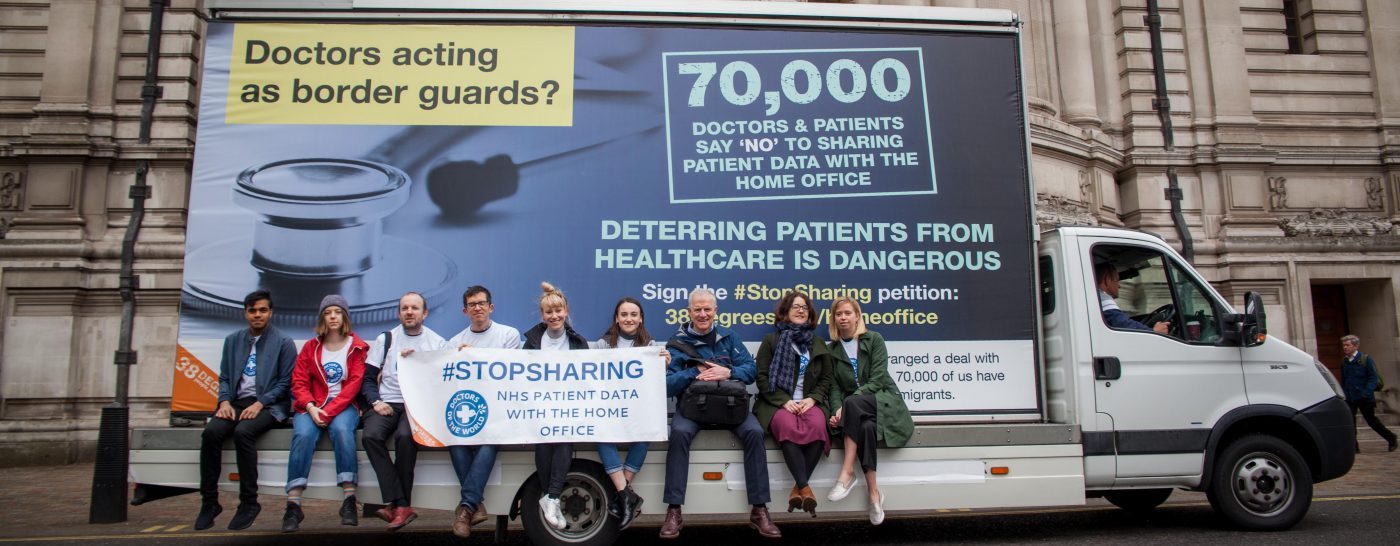Amending, suspending, unending
Published 20th December 2018
Sharing patient data and the journey of the MoU
Ella Johnson is Doctors of the World’s UK Policy and Advocacy Officer.
In early 2017 a journalist submitted a Freedom of Information Request (FOI) asking for clarity on data-sharing practices between the Home Office and the NHS. The FOI revealed a Memorandum of Understanding (MoU) that described a channel of communication between the Department of Health – responsible for the health of individuals and the wider public – and the Home Office – responsible for identifying and deporting people living in the UK who find themselves undocumented. Without the knowledge or consent of doctors and nurses, the NHS was sharing private patient information with Home Office immigration enforcement teams.
The third party in the deal was NHS Digital, the body which ‘guards’ NHS patient records. Healthcare professionals are only allowed to break patient confidentiality and share information with the police in the case of serious criminal offences (murder, manslaughter or rape, as per the GMC guidelines). Yet NHS Digital began sharing undocumented migrant’s information solely to support its immigration enforcement work.
In 2017 the Home Office requested patient address data over 3,000 times. At our clinics, patients told us that the agreement made them too afraid to access care.
In May 2018, MP Sarah Wollaston called for indefinite protection for the NHS and an end to its obligatory involvement in passing information to immigration authorities. NHS digital compromised by amending the deal which halted data-sharing in 90% of cases. Then in November following legal action, the government withdrew the MoU entirely.
Campaigners, doctors and patients may have triumphed against the MoU this year, but as it draws to a close there are still inadequate protections in place to defend patient confidentiality in the NHS. On the day the MoU was rescinded the government announced plans for a new agreement, further demonstrating its determination to find new ways to use the NHS to support immigration enforcement. Information-sharing also remains embedded within the NHS charging programme; patients who are unable to pay extortionate bills in under two months are reported to the authorities, and hospital debts block future immigration applications.
Sharing medical records represents a conflict of interest for doctors and nurses looking to maintain the best interests of their patients; that’s why over 4000 of them added their voice to our #StopSharing campaign – to remind the government that medical professionals are not border guards. The risks associated with allowing hostile environment style immigration policy to infiltrate an integral public service like the NHS were highlighted by numerous medics, patients, voluntary sector organisations and statutory bodies. NHS Digital defended the ethics of this agreement claiming address data was ‘at the lower end of the privacy spectrum’ – and so less private than clinical information. They assumed that public interest in immigration enforcement was greater than public interest in a confidential health service. By sharing patient records with the Home Office, they lowered the threshold for ‘serious crime’ to encompass suspected immigration offences for the first time.
Going forward into the new year, we must remain vigilant against the manipulation of ethical safeguards which are in place to keep the health service independent. The MoU has been defeated in its original terms, but data-sharing was in place before its conception and is continuing in its absence. As a priority, DOTW UK will continue to advocate for a clear distinction between the health service and immigration authorities, and an end to the data-sharing mechanism triggered by patient debt within the so-named ‘cost recovery programme’.
